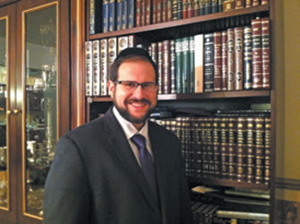
For almost a decade I had the great privilege of being the guidance counselor in Yeshiva Bais Hachinuch. On one occasion, I was conversing with the yeshiva’s executive director, Mr. Yehuda Avrohom Most. I mentioned to Mr. Most that I was impressed with a particular speaker who was always careful to check the veracity of his stories before he related them publicly. Mr. Most replied that while it’s true that that speaker always researches his stories, the way he says them over may not necessarily be the way the stories actually happened.
As an example, he began relating to me a personal anecdote. On one occasion he was flying somewhere first class and seated next to him was the New York Yankees legendary slugger Mickey Mantle. My jaw dropped, “You sat next to the Mick? Did you say anything to him?” Mr. Most nodded, “I asked him to pass me the magazine that was in front of the seat next to him, which he did.”
I couldn’t believe it, “That’s it? You didn’t ask him for his autograph or anything more?” Mr. Most looked at me sharply, “Listen, I met Rav Moshe Feinstein, zt”l, and I met Rav Aaron Schechter, shlita. Those are great people. Mickey Mantle didn’t mean anything to me. I didn’t care for his autograph or to speak to him.”
That was the story. Mr. Most continued, “I related that experience to a friend of mine who is a public speaker. Sometime afterward he repeated the story, telling everyone that I had been on a plane seated next to Mickey Mantle but I held myself back from asking him for his autograph because, after having met Rav Moshe and Rav Aharon, I didn’t want to display any honor toward him. Technically, it’s a true story. But that’s not the way it happened. I didn’t hold myself back; I frankly didn’t care at all. Mickey Mantle didn’t excite me in the least bit.”
It’s a great insight. A story can be true in the sense that all the details are technically factual. Yet the way it’s conveyed may not be the way it happened. It can be overly dramatized and certain parts can be exaggerated or emphasized, though when it occurred that wasn’t at all the intent.
In the aforementioned story, the twist is innocuous. But at times the way a story is twisted can completely distort the facts.
Perhaps there is no starker example of this than the holiday of Chanukah. There is no other holiday whose meaning and significance has been so tragically misunderstood. Chanukah is sometimes touted as a seasonal holiday, that has the least bit of connection to the Christian holiday that happens to take place within a few weeks of Chanukah. Chanukah is also often portrayed as a celebration of the underdog beating the odds. We love the stories of the peasant girl being chosen to marry the prince, the unlikely athlete with the prosthetic leg winning the gold in the Olympics, and the failing student becoming the class valedictorian.
Those who view Chanukah in that manner cheapen it to a Hollywood classic. While the details are true, and it was indeed an unlikely victory of the few against the many, that is a gross misunderstanding of the true greatness of what occurred.
Chanukah is the celebration of those who refused to allow their observance to become tainted with outside influences. It is the story of those who were ready to die for the right to maintain their religious beliefs. It’s about those who subjugated themselves to a higher authority and refused to submit to many of their brethren who couldn’t comprehend their obstinacy.
It’s the perpetuation and celebration of the Chanukah story that ensures we maintain our commitments to Torah even in America 2018.
It’s what compels a group of observant Jews to become emotional and excited when trapped on an El Al flight with the prospect of Shabbos desecration looming. (Yet, despite being repeatedly lied to, they didn’t behave inappropriately at all. Reports that they acted violently was a blatant lie.) They don’t have the choice to relent on their religious obligations so that their non-religious brethren aboard the flight not lose out on their weekend plans by flying directly to Israel. Shabbos is a mandate from on high and it is not within their rights to tamper with it, ever.
Unlike every other holiday, the story of Chanukah does not have an official text we are obligated to read during the holiday. That is part of the reason why the holiday is so misunderstood. But the essence of the holiday is the celebration of unbroken tradition, and therefore it must transcend text.
It is incumbent upon us to remember the true story of Chanukah, to celebrate it joyfully, and to internalize it, and convey it wistfully to our children. The Chanukah lights contain the secret to our eternity—our refusal to capitulate and to remain loyal to Hashem and His Torah. It’s an eight-day holiday of thanksgiving where we thank God for all He bestows upon us. But above all, for the opportunity to be the torch-bearers of His holy Torah.
All the other beautiful aspects of Chanukah—dreidels, presents, gelt, latkes and doughnuts—are all merely gift wrapping.
By Rabbi Dani Staum, LMSW
Rabbi Dani Staum, LMSW, is a rebbe and guidance counselor at Heichal HaTorah in Teaneck, NJ, principal at Mesivta Ohr Naftoli of New Windsor, and a division head at Camp Dora Golding. He can be reached at stamtorah@gmail.com. Looking for “Instant Inspiration” on the parsha in under five minutes? Follow him on Torahanytime.com.












